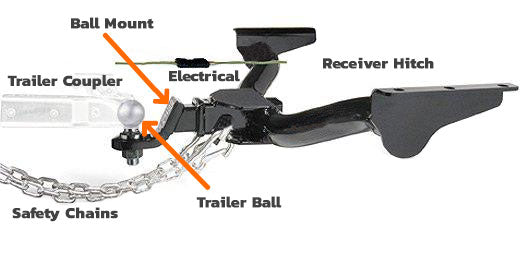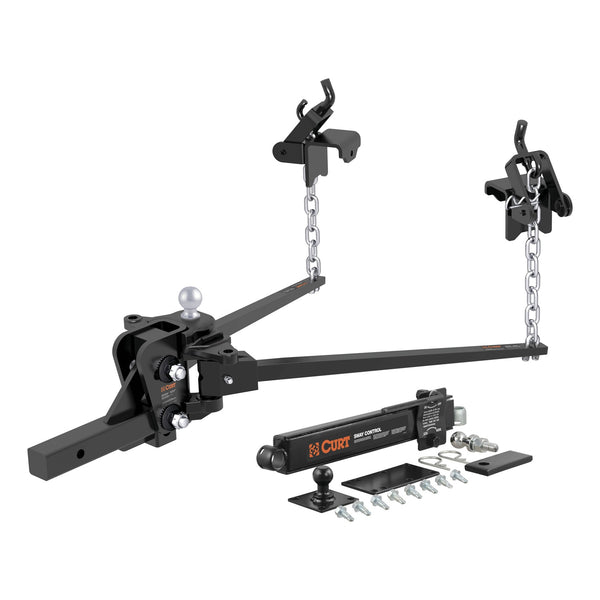Definitive Shock Guide for Towing & Hauling
How Good Shocks Help Towing & Hauling
Factory suspensions are notoriously oversprung and under-damped (not enough shock). This means that even though your heavy duty truck may handle 4000lbs in the bed and remain inside the Gross Vehicle Weight rating, that doesn’t mean the puny twin tube shock can dampen the load effectively.
We recently upgraded two different vehicles at Shock Surplus with Bilstein 5100s to address towing concerns, we had some awesome results both to the butt-dyno and driver confidence.
While the leaf springs or coil springs are carrying the load, the shock serves as a stabilizer for the load, and most factory shocks have poor rebound valving.
Here’s what we mean:
- When going up a driveway with a heavy load, the rear suspension is going to compress as that load hits the uneven terrain / sidewalk.
- The rear springs are eating up a lot of that energy, the shocks are just slowing it down a bit to prevent bottoming out.
- But on the rebound action, as the load is coming out of compression, factory shocks are not valved to handle that much kinetic energy being released, which results in a sort of bounce or boaty feeling.
- This starts a cycle of up-down-up-down until the vehicle settles. Good shocks can reduce that cycle by 50% in a predictable way.
Shocks which are specced for heavier loads have better rebound valving, which means as that weight comes out of compression, the shock slows down the rebounding weight a lot better. This translates to no more second or third compression force as the weight doesn’t need to come crashing down again on the suspension.
This makes a huge difference in driver-confidence when your rear end load isn’t going up and down or swaying left and right excessively.
Frequently Asked Questions - Towing & Hauling
Do shocks help with towing?
Not just any shock will make your towing experience better, simply replacing poor factory shocks will not make things better. Going with a properly dampened shock for hauling or towing, or even an off-road oriented shock will significantly help towing behavior by reducing excessive bounce or sway in your vehicle.
A safe and dependable shock upgrade for towing are Bilstein 4600/5100 series, KYB monomax, Rancho RS7MT, Rancho RS9000XL. All of which have their pros and cons. We typically recommend Bilstein since the digressive valving nature of the shocks provide the most aid in vehicle handling.
Do adjustable shocks help with towing?
Adjustable shocks can certainly help with towing, since you can typically adjust compression valving within the shock by the turn of a knob. Shocks such as the Rancho RS9000XL, or Fox 2.0 CD, can be adjusted to behave on the firmer range of valving when under load or towing to give the best handling. Once unloaded, the shocks can be adjusted to return to a softer ride if desired.
How can I improve my towing suspension?
When under load, whether with a 5th wheel, travel trailer, toy hauler, or any load-in-tow - a stock vehicle will typically sag in the rear due to the nature of the factory suspension, which is usually setup for comfort, rather than heavy duty needs. And even if the rear springs (coils or leafs) are heavy duty enough, the shocks in that suspension are typically under-dampened for such loads, which results in excessive rebound (rear bouncing and boaty behavior).
- Add-a-Leafs - These are leaf springs that get added onto the top of the existing leaf springs on your vehicle. These usually add additional ride height to your rear suspension, which translates to less squat when loaded. A con of this setup may be a more harsh ride when unloaded.
- Full Leaf Pack - this is a total leaf spring replacement that can both improve the ride quality, and handle heavier loads.
- Air Bags - these are air bags that can be inflated manually or electronically to support the suspension when under load. They effectively inflate to prevent the suspension from sagging past a certain point. There are helper bag systems that work with both leaf spring and coil spring suspensions.
- Progressive Foam / Rubber / Urethane Springs - These are like giant bumpstops that are placed in the rear suspension that absorb the heavy loads, and reduce sagging. Typically these ‘springs’ engage early on in the suspension travel to slow down movement in the rear, and then get progressively firmer as more load is added or more travel occurs.
Do Rancho shocks help with towing?
Some Rancho shocks can help with towing. Lots of our customers have complained about the factory Rancho shocks that come equipped on many Ford and Chevy models from the factory, being too soft for heavier loads, or even for an unloaded factory vehicle.
Rancho has both the RS7MT Monotube and the RS90000XL Tri-Tube Adjustable shock that can aid in towing and hauling heavy loads. The RS7MT is a monotube shock with a large active piston, which provides consistently and excellent rebound properties to help prevent too much sway and excessive bounce in the rear. The RS9000XL is an adjustable shock with a compression adjuster. By increasing the compression setting, this will stiffen up the shocks, essentially resisting the compression (down) force occurring on the suspension. Heavy Duty trucks like these, as you can adjust the rear of the vehicle to be firmer than the front.
Why does my truck squat when towing?
When placing the trailer hitch on the tow-hitch of your vehicle, this is called the tongue-weight, and in most cases will distribute anywhere between 400-800lbs of weight to the rear of your vehicle. This is dependent on the total trailer weight and the way the trailer is balanced around its axle(s).
Most factory vehicle suspension cannot absorb this kind of weight without losing ride height, sometimes it affects ride height so much that it becomes detrimental and even dangerous for the overall handling of the vehicle.
Will air bags help with towing?
Air bags can help keep your vehicle’s ride height consistent when under load. If your vehicle is sagging in the rear when towing or hauling loads, the air bags can serve as a support system, keeping the rear ride height level with the front. By doing so, this keeps the vehicle handling consistently and within factory specifications, rather than having too much weight in the rear, which is detrimental to the front suspension dynamics.
Weight Distribution Basics and Equipment Considerations
A solid, durable, and well performing shock will help your vehicle last much longer, cost less in maintenance, and have you riding comfortably. Adjustability is a good option for special equipment vehicles that see large differences in weights from front to rear, or carrying task-specific equipment, or even just carrying around some dirtbikes.
Shocks are only one part of hauling heavy loads or towing a trailer or toy hauler. Typically under heavy loads, trucks' rear leaf springs will be handling most of the load and absorbing road feedback, while the shocks help slow down and control the movement of the rear end. For instance, a truck with a progressive leaf pack, or add-a-leaf spring on top of their stock setup will experience a ‘smoother’ ride when there is a load in the bed compressing the leaf springs into the prime window of optimal travel. Its no surprise unloaded heavy duty or super duty trucks like the F350 or a Duramax will typically ride very firm and bouncy in the rear without an additional 300-500lbs.
- If you’re bottoming out over bumps or other obstacles, your suspension is fully compressed and hitting bumpstops within the rear shocks or on the rear axles. This typically means you’re approaching or passing the limit of the vehicle load rating. A shock will not prevent bottoming out of your suspension, and you should consider add-a-leafs for your leaf pack, or a new leaf pack that has a higher load rating, or a factory replacement to refresh the rear end capabilities.
- When towing a trailer or something similar, tongue weight is the biggest factor to pay attention to. The trailer should be as balanced as possible, equalizing the weight between front and rear over the trailer’s axle (if single), or arranged between axles (if dual). This will eliminate excessive weight being transferred to the vehicle, and will minimize rear end travel. This minimizes the requirement of the shocks and springs to stabilize the load.
- Rear shocks will wear out faster than normal, due to having more work and loads to stabilize. The shock will be working in the extremes of its travel lengths, along with higher than normal velocity. Both of these factors contribute to shock wear within the construction, wearing out seals and internal components from extreme pressures being generated by larger articulation.
GTW - Gross Trailer Weight
This include the total weight of the trailer, fuel, and anything else loaded on.
TW - Tongue Weight
Tongue weight is the part of the load (10-15% of GTW) that's far enough forward in the trailer to press down on the hitch. Tongue weight also includes any weight that's behind the rear axle of the towing vehicle (near the tailgate). So if you plan on loading up the trunk, you'll need to factor that in.

Too Much - Too Little
There's a balance that needs to be considered when loading the trailer, too much tongue weight in relation to trailer weight can cause the hitch of the trailer (front of trailer, rear of vehicle) to dive to the ground. This brings the front of the vehicle up, resulting in poor braking ability, poor traction, and loss of steering control. Serious consequences. If there's too little weight, the trailer is prone to swing back and forth, causing the tow-vehicle to fish tail and lose traction. This is why finding a balance between gross trailer weight and tongue weight is so important.
Other options to stabilize rear loads, while also maintaining good ride quality while not loaded, would be an Air Suspension setup. These systems allow on the fly adjustment of air bags in the rear suspension, to equalize vehicle weight front and rear, preventing rear end sag under excessive load.
Additionally, if you're looking to get into serious towing, whether commercially or recreationally, start looking into weight distribution systems.




